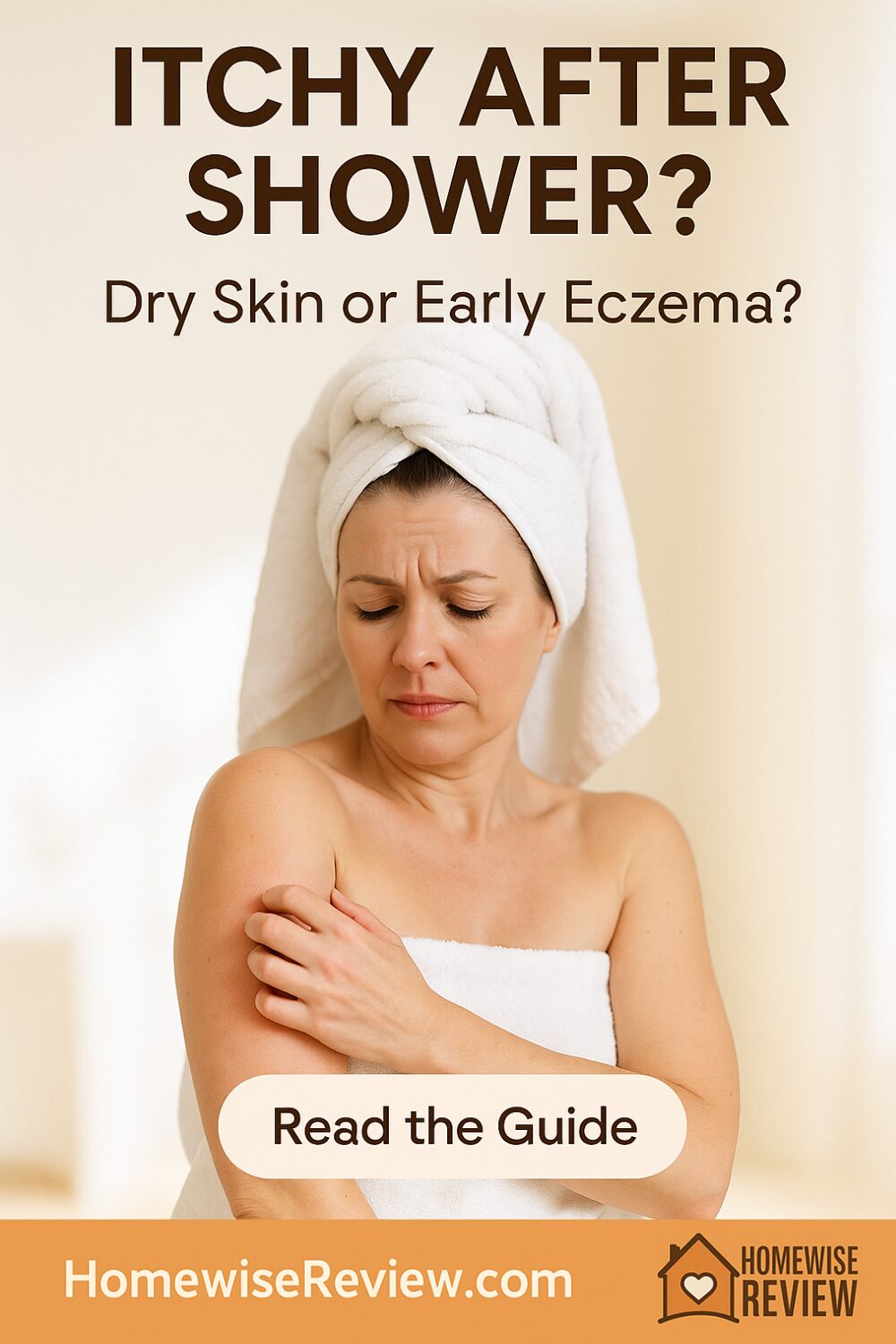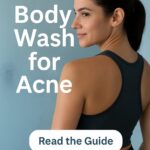
You step out of the shower, towel off, and within a few minutes your skin is crawling. Itchy, tight, sometimes a little pink. Annoying, but normal dryness… right? Or is that how eczema starts?
Post-shower itch can be totally normal, especially if you like long, hot showers or you use body wash that foams a lot. Hot water and harsh cleansers strip natural oils from the skin, which weakens the skin barrier and makes water evaporate faster. That leaves skin tight, dry, and itchy
But there is a line where it stops being “I overdid it in the shower” and starts looking more like early eczema. Eczema, especially atopic dermatitis, is not just dry skin. It is inflammation. The barrier is damaged enough that irritants and allergens get in, and your immune system reacts. That is why eczema feels intensely itchy, can look red or bumpy, and tends to come back in the same places. AAD+2Mayo Clinic+2
This guide will help you figure out which situation you’re probably dealing with, what you can fix at home, and when you should talk to a doctor. This is for general guidance only, not medical diagnosis.
Why post-shower itch happens
If the itch shows up mainly right after bathing and fades once you moisturize, the most common reason is basic dryness. Hot water softens the top layer of skin, lifts away protective oils, and then that water quickly escapes as you towel off. The result is “my skin feels tight and itchy within 10 minutes of the shower,” especially on legs, arms, and stomach. National Eczema Association+1
That is different from eczema flare itch, which can start even before you see a visible rash. Dermatology groups call eczema “the itch that rashes,” because the urge to scratch sometimes shows up first, then the bumpy, scaly, or red patch follows. Mayo Clinic+1
Water temperature matters here. Very warm or hot showers raise the chance of both dryness and eczema irritation. Hot water increases transepidermal water loss, which just means moisture escapes from your skin more easily afterward. Lukewarm water is less aggressive and is recommended for dry, sensitive, or eczema-prone skin.
Cleansers also play a role. Strong lathering soaps and heavily fragranced washes can strip the barrier and leave that stingy, itchy feeling the minute you dry off. Gentle, fragrance-free cleansers for sensitive skin are less likely to trigger that reaction. Medical News Today+1
Early eczema signs to watch for
Eczema in adults often shows up as patches of skin that are not just dry but actively inflamed. Look for:
- Red, pink, or grayish patches that feel rough, scaly, or leathery
- Small bumps that may ooze or crust if you scratch
- Itch that feels intense, not mild, and can keep you awake or distract you during the day
- Areas that keep coming back in the same spots, like inner elbows, backs of knees, wrists, neck, or waistband areas where sweat and friction happen AAD+2Mayo Clinic+2
With plain dryness, you usually feel overall tightness and faint itching everywhere the water hit, and it improves quickly with a thick moisturizer.
With early eczema, the itch is more “I cannot stop scratching this one patch,” and if you look closely that patch is irritated, not smooth. Eczema tends to flare in cycles. It improves, then something sets it off again, like stress, fragrance, long hot showers, cold dry weather, or certain fabrics rubbing the same spot. AAD+2National Eczema Association+2
If the area ever becomes crusty yellow, weepy, swollen, or suddenly painful, that can mean infection on top of eczema, which needs medical attention. Cleveland Clinic+2nhs.uk+2
The “shower routine test”
One way to get clues is to change your shower routine for three days in a row and see how your skin behaves. Dermatology groups and eczema charities give similar advice for calming reactive skin in the bath or shower. AAD+2National Eczema Association+2
Here is the test:
- Keep water warm, not hot. Aim for comfortable, almost neutral water, not “spa hot.”
- Keep the shower short. Around 10 minutes or less.
- Use a gentle, fragrance-free cleanser only where you actually need it, like underarms, folds, and anywhere sweaty. Do not scrub with a loofah or scratchy towel.
- When you get out, do not rub skin dry. Pat with a soft towel and leave your skin slightly damp.
- Within three minutes, seal in that water. Use a thick cream or ointment style moisturizer, not a thin lotion. Apply it everywhere that usually itches. National Eczema Society+4AAD+4National Eczema Association+4
Now watch what happens.
If the after-shower itching drops a lot within those three days, you were most likely dealing with barrier dryness and irritation, not a full eczema flare.
If you are still getting intense, local, maddening itch on specific patches, and those patches look angry or rashy, that leans more toward eczema and it is worth getting a professional opinion.
Fast relief steps you can safely try
Short term, you want to calm itch, hold moisture in, and avoid triggers that keep restarting the cycle.
First, moisturize like it matters. A thick, fragrance-free cream or ointment creates a seal that slows water loss and supports the skin barrier. Eczema groups recommend applying moisturizer within about three minutes of stepping out while skin is still a little damp, then reapplying at least twice a day on trouble spots.
Second, watch fabrics. Anything rough, tight, or scratchy at the waistband, bra line, inner thighs, or belly fold can rub a patch raw and keep that area itchy even after you moisturize. Cotton or other soft, breathable fabrics are usually easier on irritated skin. Overheating under heavy layers can also make itching worse. National Eczema Association+1
Third, manage heat and air. Super dry heated indoor air plus long hot showers is a classic winter itch setup. A lukewarm shower and a normal indoor humidity range (often suggested around 30 percent to 50 percent) can help the barrier hold on to moisture better.
If you are still itching so badly that you are losing sleep or breaking the skin from scratching, that is not “just dry.” At that point, talk to a clinician, because prescription creams or anti-itch treatments may be needed. Mayo Clinic+1
When to call a doctor
Call a doctor or urgent care if you notice any of these:
- The itchy area is now red, warm, swollen, crusty, leaking fluid, or has pus-like bumps. That can mean infection and should be looked at quickly.
- You have a new widespread rash plus fever or you feel generally unwell.
- You are so itchy that you cannot sleep, you are scratching open skin, or you are starting to see bleeding or scabs from scratching. Mayo Clinic+1
- The same spot keeps flaring again and again even after careful shower changes and moisturizer.
Those situations are above normal dryness. They are also above home care. Eczema is treatable, and getting ahead of infection matters because infected eczema sometimes needs antibiotics or prescription anti-inflammatory treatment, not just lotion. Cleveland Clinic+2nhs.uk+2
For most people without those red flags, dialing down water temperature, switching to gentle cleanser, patting dry, and moisturizing while damp will calm the post-shower itch over the next few days. AAD+2National Eczema Association+2
Final Thoughts
Quick recap. If your whole body just feels dry and tight after a hot shower, and calming moisturizer fixes it fast, that is likely plain dryness and barrier irritation. You can usually get that under control by taking shorter, warm (not hot) showers, using a gentle body wash, patting dry, and sealing in water with a thick cream right away.
If you are dealing with focused, intense itch in the same repeat spots, patches that look red or scaly, oozing or crust, nighttime scratching, or sleep disruption, that pattern is closer to eczema. Eczema is common and manageable, but it is not something you have to just live with. A clinician can help you build a plan, sometimes including prescription topicals or other targeted treatments. Mayo Clinic+2Mayo Clinic+2
Either way, paying attention to what happens in the first 10 minutes after you towel off will tell you a lot about what your skin is trying to say.
See also
If showers leave you itchy and tight all over, you may just be dealing with a moisture problem, not an infection. Thick, fragrance-free wash and immediate lotion can make a huge difference. You can read more barrier-friendly cleansing tips in Best Body Wash for Sensitive Skin, and if you already know fragrance tends to set you off, take a look at Best Body Wash for Eczema and the gentle-soothing routines we outline in Allergy Season Skin Plan: Redness and Dryness for keeping skin calm when the air is dry and heated.
If your skin feels rough, scaly, and almost ashy after you bathe, sealing in water matters just as much as the soap you choose. Our hydration picks and layering tips in Best Body Lotion for Dry Skin and targeted barrier support in Best Body Lotion for Eczema walk through how to lock in moisture, reduce that “itch right after the shower” feeling, and protect spots that tend to crack first around shins, thighs, and elbows.
FAQs
1. Is it normal for my legs to itch like crazy after every shower?
Mild itch and tightness on legs is common after long, hot showers because hot water strips oils and then that water quickly evaporates, leaving skin drier than before. Switching to shorter, warm showers and moisturizing within a few minutes of towel-off usually helps within a couple days.
2. Can eczema start in adulthood even if I never had it as a kid?
Yes. Atopic dermatitis, the most common type of eczema, can develop or flare in adults. It often shows up as red, itchy, sometimes scaly patches that keep returning in the same areas, especially where sweat and friction happen.
3. How do I tell the difference between super dry winter skin and actual eczema?
Dry winter skin usually feels itchy and tight everywhere the shower water hit, then calms once you moisturize. Eczema tends to be very itchy in certain patches that look irritated, and those patches keep coming back. If the spot cracks, oozes, or crusts, or if the itch is waking you up at night, talk to a clinician.
4. What is the right way to dry off if I’m sensitive?
Pat, do not rub. Rubbing with a towel can scrape away what little protective oil you have left and make the itch worse. Pat until skin is damp, then apply a thick, fragrance-free moisturizer within about three minutes to lock in water and support the barrier.
5. When is itchy skin after a shower an emergency?
Get urgent help if the itchy area suddenly becomes swollen, warm, painful, crusty, yellow, or oozing, or if you have fever or feel unwell with a rapidly worsening rash. Those can be signs of infection on top of eczema and need medical treatment, not just lotion.
Affiliate Disclosure
If you purchase through links on our site, we may earn a small commission at no extra cost to you.




